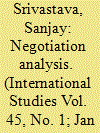| Srl | Item |
| 1 |
ID:
085723


|
|
|
|
|
| Publication |
2008.
|
| Summary/Abstract |
This article studies the nature of relationship between Japan and Bangladesh focusing mainly on the Japanese Overseas Development Assistance (ODA) policy for developing countries such as Bangladesh. It also covers trade and other related issues that shape the bilateral relations of these two countries in a historical perspective. This is an interesting study as Bangladesh has consistently been a major recipient of Japanese aid and assistance for a long time in various areas of crucial importance for Bangladesh's development ranging from education, health, rural development, power plant development, private sector development, urban waste management, infrastructure development like building big bridges over mighty rivers, water supply in major cities, good governance and democratization projects. Japan is a great economic power and also regarded as an 'aid great power' but not a military superpower, thus, what determines its economic assistance policy and relations with a country like Bangladesh in South Asia is the central theme of this paper. Cultural relations between Japan and Bangladesh even go beyond the recent diplomatic history.
|
|
|
|
|
|
|
|
|
|
|
|
|
|
|
|
| 2 |
ID:
085724


|
|
|
|
|
| Publication |
2008.
|
| Summary/Abstract |
In this article, I address the question of negotiation analysis pertaining to the Cancun Ministerial of the World Trade Organization (WTO). Albeit, the deep differences between developed and developing countries on various trade issues could not be accommodated and the Cancun Ministerial finally collapsed, the coalitional diplomacy and the joint obstinate position taken by the developing countries were unparalleled and deserve concentrated analysis of negotiations and various strategies pursued during the Ministerial. The central contingent variable, in this study is the negotiation strategy pursued by the developing countries at Cancun. In more practical terms the coalitional diplomacy with special reference to the coalition of G-20 and distributive strategy used by the developing countries, have been investigated. Other derivative inquiries delineated here are: how developing countries adhered to and maintained their coalition G-20 at Cancun and the counter strategies of the developed world pertaining to moves made by the developing countries including endgame diplomacy.
|
|
|
|
|
|
|
|
|
|
|
|
|
|
|
|
| 3 |
ID:
085725


|
|
|
|
|
| Publication |
2008.
|
| Summary/Abstract |
Weapons of mass destruction are spreading in the Asian region. Five countries in the region have nuclear weapons while some more are in the process of acquiring such capabilities. Several of them either have or are in the process of acquiring capabilities in ballistic missiles, chemical and biological weapons or technologies. Vertical or horizontal transfers to some extent have helped these states to acquire WMD. A number of arms control and disarmament measures and regimes have come up from concerned individuals, social groups and institutions at the national, regional and global levels to address this issue. No major escalation control procedures, specifically in nuclear or missile launches, nor 'de-targeting' or 'non-targeting' agreements exist between Asian states. As risk factors increase in post September 11 world, different solutions were offered by several countries. While the western countries succeeded in evolving mechanisms between NATO and Warsaw Pact countries on nuclear CBMs, Asia still lacks any pan-regional monitoring agency to reflect on or curb WMD transfers.
|
|
|
|
|
|
|
|
|
|
|
|
|
|
|
|